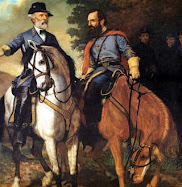This is the 150th anniversary of the third and final day at Gettysburg. It was not a last stand but a hubristic effort with minimal chance of success. Its glory--thousands of men marching for home and family, brimming with valor and bravery--is sadly overshadowed by Lee's single mistake of the war: his overestimation of his troops'--and perhaps his own--capabilities. He incorrectly weighed elementary tactical considerations about numerical strength and geography against intangibles, such as the effect of a withdrawal in his men, and their enthusiasm for a fight. It was a blunder, and likely a prideful one at that.

And yet Lee's devotion to duty and love of country, and that of his officers and men--from the cavalier, aristocratic Virginian planters to the slaveless, hardscrabble Texans with Hood--nearly brings me to tears on this day. Pickett's officers likely knew that they were matching to their death that day, yet they did so gladly. They believed in something greater than themselves, whether it was home, God, or a sense of "duty." And it is moving to think that a mass of men was willing to fight and die for these things.
Lee blundered. He disregarded basic strategic considerations for emotions. The last day is bathed in so much sadness, so much needlessness, so much folly, that oftentimes its sadness is all one can glimpse. But we should always remember its beauty. Watch Gettysburg and see the incredible love between Marse Robert and his soldiers. See the grace with which his men went into battle. And see Lee stoop and shoulder the burden of defeat and loss unreservedly. It is tragic, certainly, but it is beautiful.

No comments:
Post a Comment